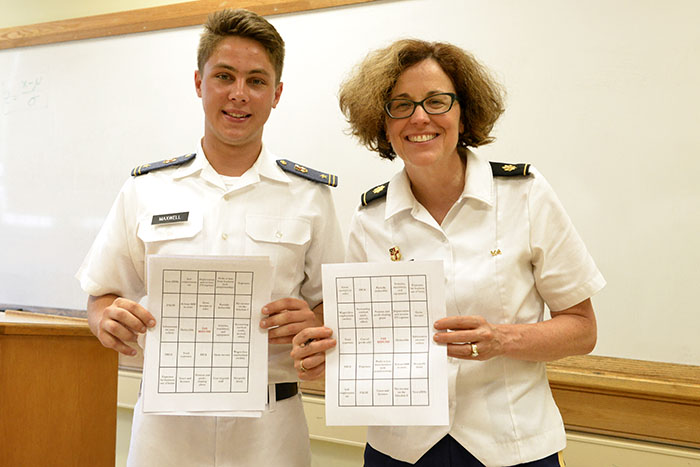Tax Bingo Game Mixes Fun with Learning

Peter Maxwell ’21 and Maj. Kathy Simms, assistant professor of economics and business, show off the tax bingo cards they created.—VMI Photo by H. Lockwood McLaughlin.
It’s well established that no one likes paying taxes—and no one likes filling out tax forms, either. But we all know there are certainties in life we just can’t avoid.
So, Maj. Kathy Simms, assistant professor of economics and business, along with two cadets created a tax bingo game this past spring with the goal of helping cadets have fun while learning about the tax rules governing a sole proprietorship. Simms and one of those cadets, Peter Maxwell ’21, presented a paper highlighting the results of their research at the American Accounting Association’s annual meeting in San Francisco, California, in August.
Simms, who is now in her third year teaching accounting at VMI, explained that the inspiration for the game began when she was teaching a tax class.
“[Cadets] really gave me their full engagement for most of the class, but when we actually looked at the tax forms, they struggled to stay focused,” she explained. “I was trying to come up with a way to teach people about taxes that would be less painful for them.”
As she mulled her options for making the subject more appealing, Simms remembered a presentation she’d attended at Old Dominion University on serious gaming. As the name suggests, serious gaming is playing a game for a goal other than pure enjoyment.
After recruiting Maxwell and Jameson Donahue ’19 to join her, Simms went to work creating bingo cards with questions about sole proprietorships on them. That form of business was chosen, Simms explained because many people form sole proprietorships if they earn money outside of a regular job, but the tax implications of this can be tricky.
As they worked, Simms, Maxwell, and Donahue sought help from others within the Department of Economics and Business. Col. Sam Allen, professor of economics and business, helped with probability estimates as to how long it should take a player to win at bingo.
“You come up with a research idea, and you take it to other knowledgeable people and they help make your research idea better,” said Simms.
Once the researchers had come up with their game structure and created the bingo cards, they had to find groups of cadets to test them on. In the end, they simply “borrowed” classes of economics and business cadets who had never had coursework in taxation.
“It wasn’t a perfect experiment,” Simms noted. “It was what we call a quasi-experiment because we couldn’t randomly assign people to classrooms for the day. A real experiment requires random assignment.”
Their quasi-experiment divided cadets into three groups. One group listened to a lecture on taxation, while another played the tax bingo game followed by a lecture, and yet another played the tax bingo game with a lecture interspersed.
In the end, the group that played the game with a lecture interspersed seemed to learn the most, as measured by scores on a pre-test and post-test.
When Simms and Maxwell presented their work, they found widespread interest.
“When we took it to the conference, I think it appealed to people a lot more because we were actually trying to test it,” Simms commented.
Maxwell, who was only in his 3rd class year when the project began, said that the experience opened his eyes to how university-level research takes place.
“I definitely learned how to conduct research—not only how to conduct research, but also how to display and format it in a scholarly article,” he commented. “I also learned a lot about academic journals in general.”
Maxwell also said he gained much from his time in San Francisco, where he and Simms split their allotted presentation time. “That was also a great experience because I had never before given a presentation to a large group,” he commented. “It was out of my comfort zone, a larger group than I was used to.”
After VMI, Maxwell hopes to work in finance—but before he does so, he’s going to study abroad in Prague, Czech Republic, this spring. After having had a chance to do research, see his name in print as co-author of a paper, and attend a professional conference, he’s eager to see other cadets take advantage of opportunities such as this.
“If anyone has a chance to do [independent research], I highly recommend it,” said Maxwell. “It’s just a great opportunity.”
- By Mary Price
.svg)
.png)